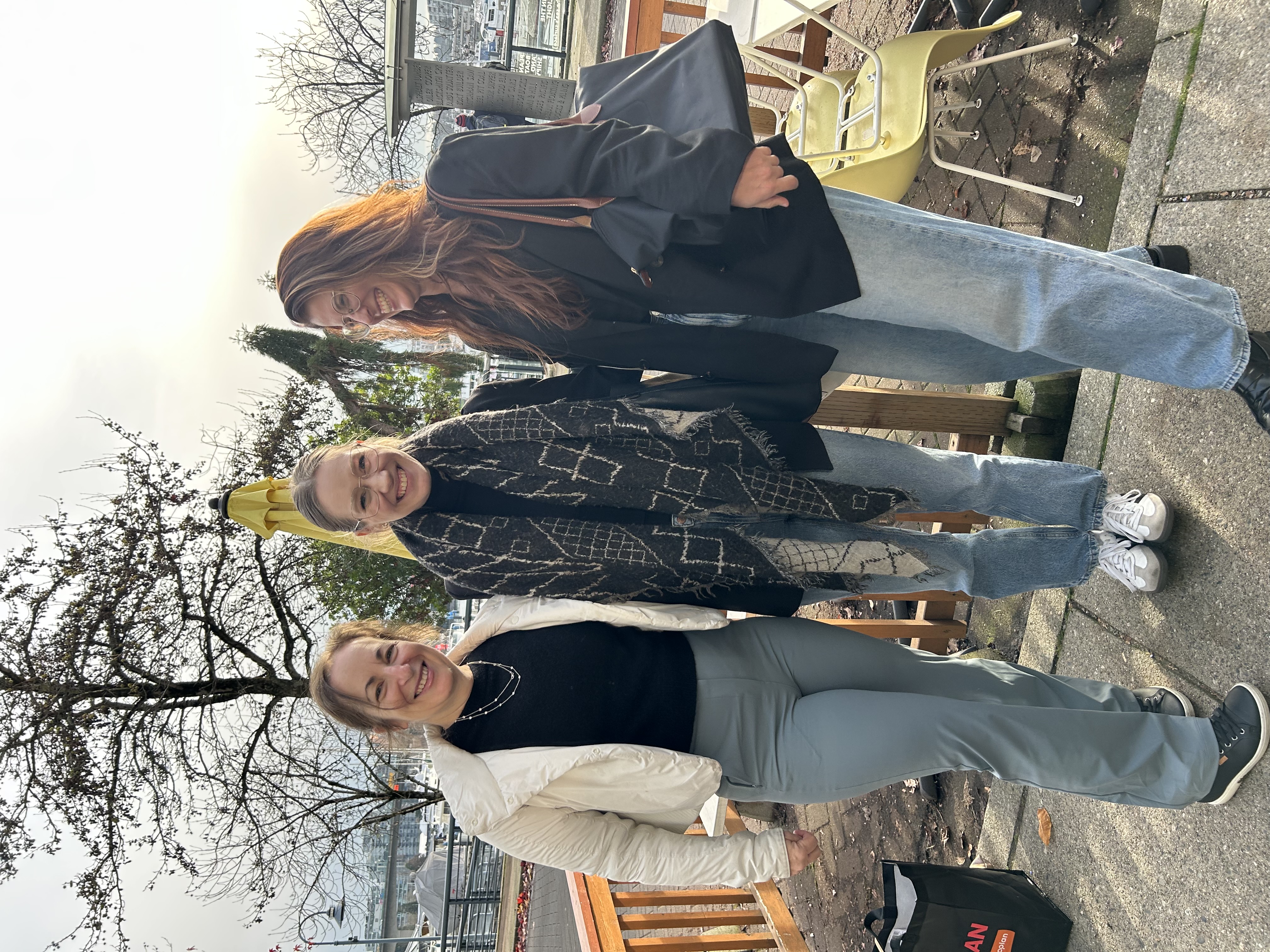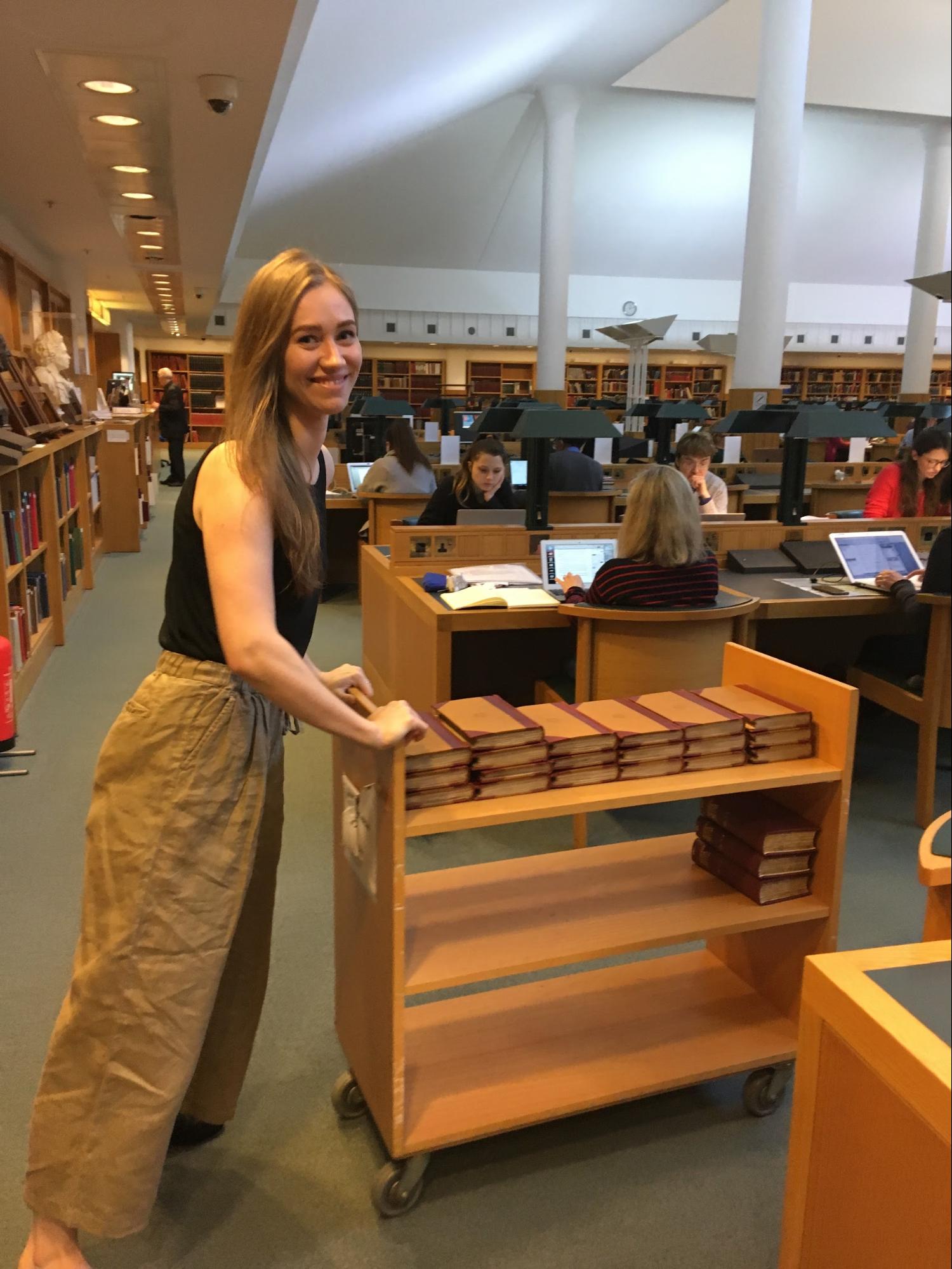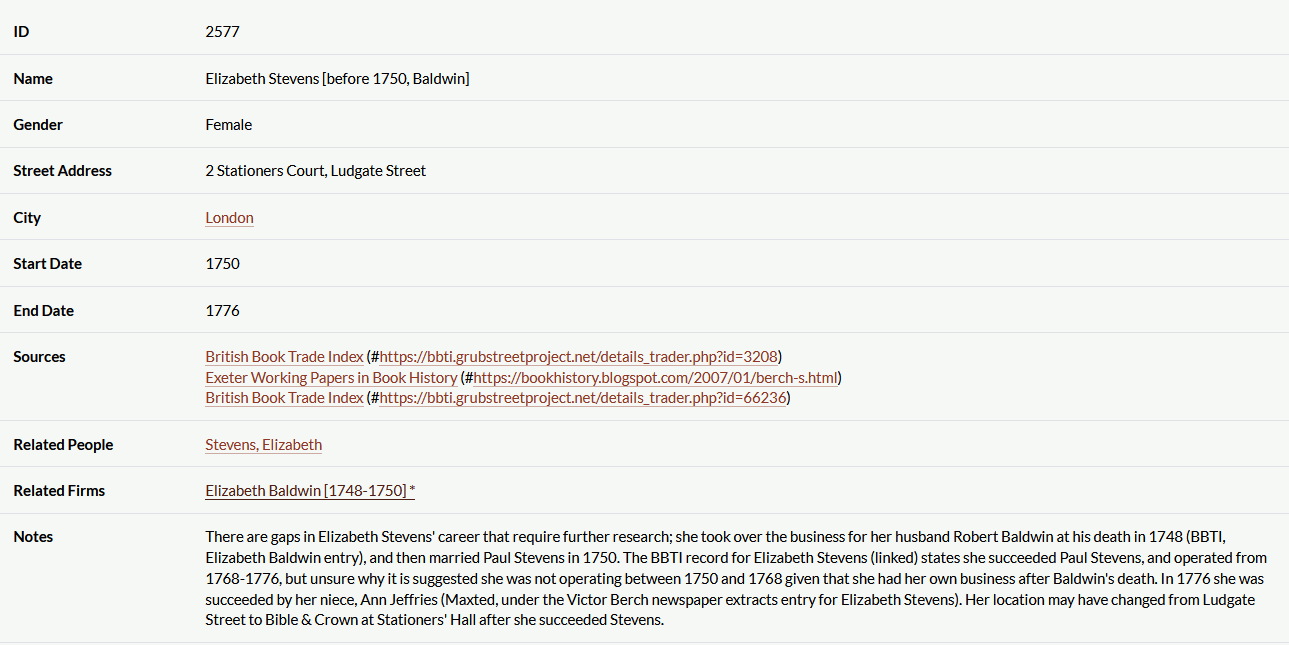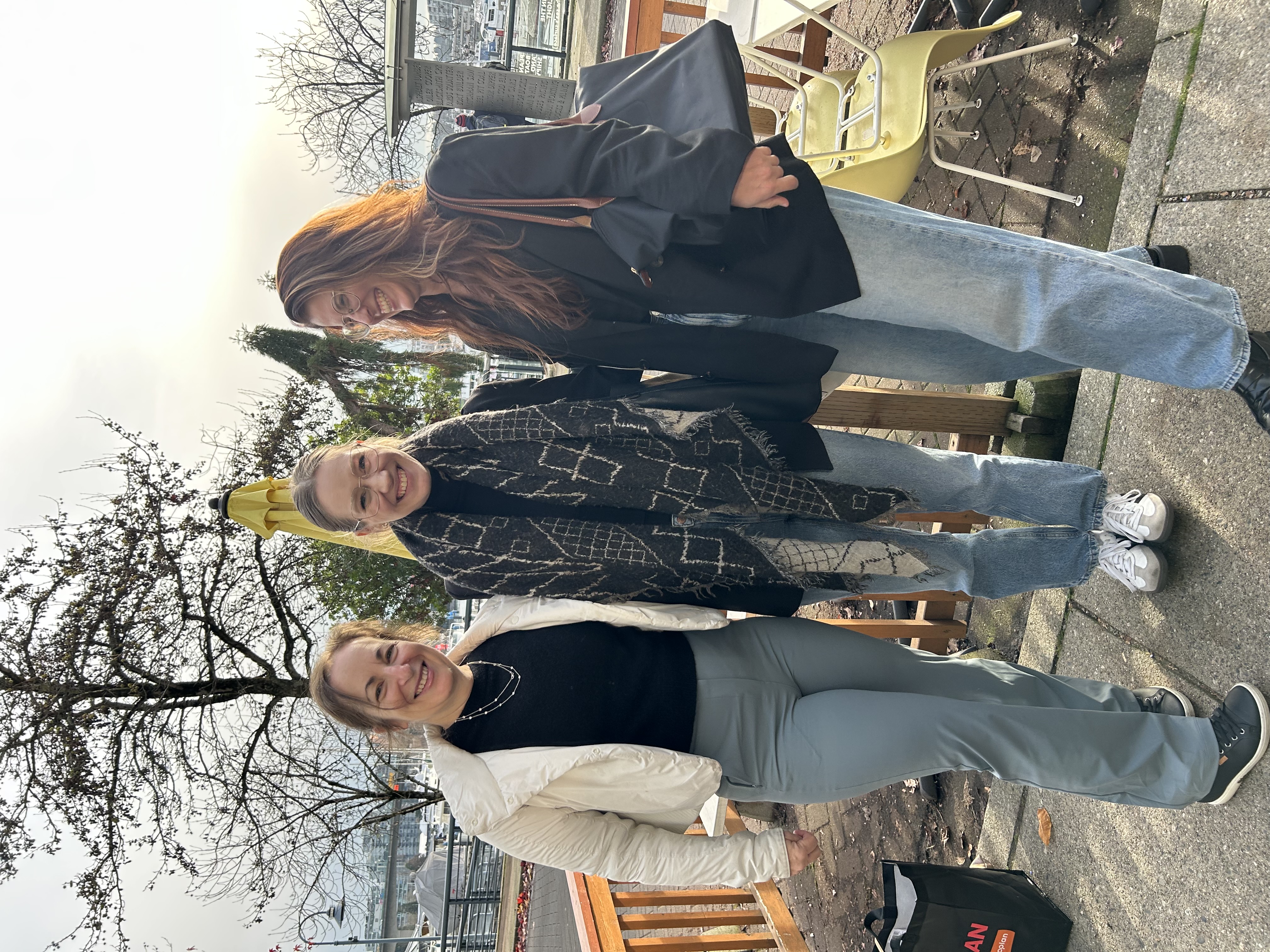This post is part of our Research in Reflection Spotlight Series, which will run through August 2025. After a decade of active and intense research and data creation, the WPHP is coming to a close this summer. To celebrate, this series shares reflections on the WPHP by our Research Assistants, Project Manager, past Project Manager turned Lead Editor, and Project Director, featuring memories, research, lessons learned, and ultimately the impact of the WPHP on the team who produced it.
Authored by: Kate Moffatt
Edited by: Kandice Sharren and Michelle Levy
Submitted on: 08
Citation: Moffatt, Kate. "Reflections of a Research Assistant-turned-Project Manager: A 'WPHP' Degree." Women’s Print History Project, 29 August 2025, https://womensprinthistoryproject.com
 Michelle Levy, Kate Moffatt, and Kandice Sharren, 2025.
Michelle Levy, Kate Moffatt, and Kandice Sharren, 2025.
In the Spring of 2016, during the second year of my undergraduate degree at Simon Fraser University, I was hired as a research assistant on the Women's Print History Project. The team was small—just two research assistants and a project manager, at the time—but it was well into its data creation efforts by even then. My first task was to track down digitizations of, and then verify, the titles then-Project Manager Kandice Sharren had brought into the database from Raven and Garside’s The English Novel; in the nine years since, I have probably created, edited, or touched somewhere in the realm of 10,000 of our more than 20,000 title records. This work has taken many different guises: laughing in delight at the exclamation points of The Three Monks!!! by Elisabeth Guénard, which resulted in two podcast episodes (see: “Of Monks and Mountains!!!” and our crossover episode with The Canterbury Fails: “MONKS!!!”), a Spotlight about Guenard’s prolific and atrociously under-studied literary career, and a lasting adoration for exclamation points in titles amongst the WPHP team; examining and sorting through the author information of the twenty-five volumes of Mrs. Inchbald’s The British Theatre for the WPHP while at the British Library (and dropping a handful of volumes in my attempt to carry a precarious stack back to my desk in the reading room, which I’ll never live down—they made me use a cart for transporting my books, after that); finding colophons in the digitizations I was looking at and adding a field for them in our title records, and becoming especially interested in the women named there, which started a years-long and ongoing interest in the traces of women printers and other women in the book trades on the books they produced.
 My volume-filled book cart at the British Library, 2018.
My volume-filled book cart at the British Library, 2018.
It is now nearing the end of 2025, and I’m a PhD student in the Department of English at Simon Fraser University studying women’s labour and visibility in the eighteenth-century London book trades. My project thinks both practically about their recovery and theoretically about the impact of their (lack of) visibility in libraries and archives. It includes a (work-in-progress) digital humanities project, “Finding Her Body of Work,” that maps the locations of women printers, publishers, and booksellers in London between 1750 and 1800 in an attempt to make radically visible—and bibliographically salient—their presence in the literal and metaphorical landscape of eighteenth-century book production. It is difficult to pinpoint an element of my dissertation that isn’t undergirded by my experience on this project. My understanding of digital humanities and book history is always developing but has its strongest foundation in helping build the WPHP. My awareness of women’s visibility in archives, or its lack, is informed by countless WPHP hours spent scouring resources and digitizations and physical books. My ability to approach existing research and sources with not only respect and appreciation for the work that has been done already but also with questions, and curiosity, and an eagerness to approach them in an effort to see the book trades differently is shaped by how Michelle and Kandice modelled their own research efforts. I have been trained to think collaboratively, to look unorthodoxly, to follow rabbit holes as stubbornly as I’d like—I’m looking at you, Elizabeth Stevens (née Baldwin), whose digitized will I tracked down in The National Archive because I was determined to sort out where her business went after she got married for the second time but before her niece inherited it from her at her death (an ongoing rabbit hole, to be sure; my paleography skills are novice at best).
 Elizabeth Stevens' firm record, which points out the gaps in the print record of her labour.
Elizabeth Stevens' firm record, which points out the gaps in the print record of her labour.
I have been not only privy to, but invited and encouraged to engage directly in conversations as small as trying to sort out a bookseller’s address, and as big as bemoaning (and, importantly, trying to sort out why) women in the book trades are so under-studied when, as the WPHP has shown, they are everywhere in archives when we stop to look for them. I give enormous thanks to the Research Assistants who have shared their work and knowledge with me over the years (as well as the joys—and commiseration—of data creation) and to our Project Lead Michelle Levy and our Project Manager and Lead Editor Kandice Sharren. Their mentorship and support gave me the most encouraging, supported, and delightful undergraduate and graduate experiences. My first conference, my first co-authored publication, my first foray into podcasting, my graduate school applications, the numerous scholars I’ve been able to meet and talk to, are thanks to them. They took every silly question as seriously as they did my serious ones, and to have my thoughts and research tangibly valued by them was, and continues to be, no small thing. I am intensely grateful for the ways in which they shaped the WPHP to be not only based on and in the work of Research Assistants, but to explicitly acknowledge that it would be impossible without them. It is not overstating things to say I feel as though I’ve been given the opportunities of a lifetime on this project, and looking back, it was utterly inevitable that the WPHP would have this kind of impact on me and my work. How could the WPHP, re-writer of history and home to the world's most hilarious and enthusiastic team, not become my emotional support database? It couldn't. It's a love story for the ages (or at least for my degree).
WPHP Records Referenced
The Three Monks!!! (title)
Guénard, Elisabeth (person)
The British Theatre (title)
Inchbald, Elizabeth (person)
Elizabeth Stevens (firm)
Elizabeth Baldwin (firm)
WPHP Monthly Mercury Episodes Referenced
Season 1, Episode 5: "Of Monks and Mountains!!!"
Season 3, Episode 4: "Canterbury Fails x The WPHP Monthly Mercury: MONKS!!!"
Spotlights Referenced
"A Gothic Ménage: Guénard, The Three Monks!!!, and Translation" (Kate Moffatt)
Works Cited
Garside, Peter, James Raven, and Rainer Schöwerling, eds. The English Novel, 1770–1829. 2 vols. Oxford University Press, 2000.
